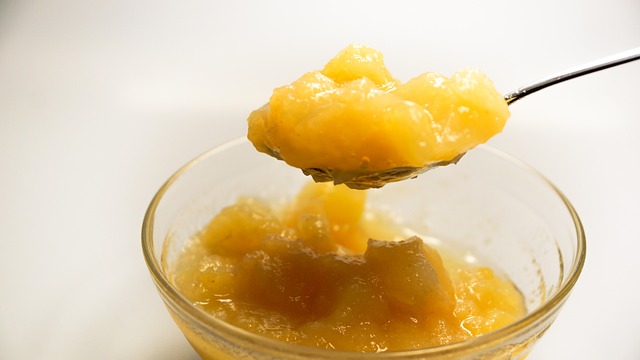
Applesauce can be a tasty treat for humans and it can be a fun way of getting our regular dose of fruits in. However, when it comes to sharing it with our canine companions, pet owners often wonder “can dogs eat applesauce too?” The answer is complicated, as dogs can eat certain kinds of applesauce in moderation, but there are several important considerations to keep in mind and risks to be aware of to ensure it’s a healthy addition to their diet.
Table of Contents
Is Applesauce Safe for Dogs?
To answer the question of “can dogs eat applesauce?”, there are a few considerations. Generally, plain applesauce, without any added sugars, spices, or sweeteners, can be okay for dogs. However, the main concern is the presence of harmful or even toxic ingredients, such as xylitol, used in store-bought, processed applesauce. Additionally, you want to beware of any remaining seeds or core of the apple, as they can be a choking hazard and toxic to dogs. Given these considerations, if you are going to serve your dog applesauce, it’s best to make it from scratch so you can ensure that it is free from these harmful additives, especially xylitol, which could cause death in dogs if ingested.
Considerations and Precautions
While plain, unsweetened applesauce can be a healthy treat in moderation, there are several factors dog owners should consider:
- Sugar Content: Many commercial applesauces are high in added sugars, which are unhealthy for dogs and can lead to obesity, dental problems, and even diabetes. Always opt for unsweetened, natural applesauce.
- Xylitol: Some applesauce brands may contain xylitol, a sugar substitute that is extremely toxic to dogs. Even small amounts can lead to hypoglycemia, seizures, liver failure, or even death.
- Portion Size: Even natural applesauce should be given in moderation. Too much can cause stomach upset or diarrhea, especially in dogs with sensitive stomachs.
- Allergies: Although rare, some dogs might be allergic to apples. Thus, it’s important to introduce it slowly and monitor for any signs of an allergic reaction.
- Frequency: Treats like applesauce should be given sparingly, not as a daily supplement or staple in their diet.
- Dietary Needs: Dogs with diabetes, obesity, or other health conditions often need stricter dietary restrictions. For these dogs, even small amounts of applesauce may not be advisable.
- Whole Apples vs. Applesauce: Some dogs might prefer or benefit more from a small, manageable slice of a whole apple, which provides additional fiber and less concentration of sugars compared to applesauce. Always remove the core and seeds, which can be harmful.
How Much Applesauce Can Dogs Eat?
When feeding your dog applesauce, or any human food as a treat, it is best to start small and only do so in moderation, as it should not take up more than 10% of your dog’s daily calories. Introducing the new foods slowly allows you to monitor their reactions and see if your dog is handling it well.
Thus, determining the appropriate amount of applesauce for dogs requires consideration of their size, overall diet, and individual health needs. Always be sure to consult with a veterinarian for personalized advice and to see if applesauce is safe for you dog’s diet in particular.
Here is a general guideline based on dog size:
- Extra Small (<10 lbs): For extra small dogs, less than a teaspoon of unsweetened applesauce is generally a safe starting point.
- Small (10-25 lbs): Small dogs can usually have about 1 teaspoon of applesauce.
- Medium (25-60 lbs): Medium-sized dogs can often enjoy about 1 to 2 teaspoons of applesauce.
- Large (60-100 lbs): Large dogs can typically have 2 to 3 teaspoons of applesauce.
- Giant (100+ lbs): For giant breeds, up to 1 tablespoon of applesauce can be appropriate, but moderation is still key.
Remember, these are very general guidelines and should not replace a veterinarian’s advice about your own dog’s individual needs. Always consult a vet before introducing them to a new food like applesauce so they can offer advice on how to safely do so.
Nutritional Benefits of Applesauce for Dogs
Plain, unsweetened applesauce, with its main, or only, ingredient being apples, contains several beneficial nutrients that can be good for dogs:
- Vitamins: Apples are a good source of vitamin A and vitamin C, which can help support a dog’s immune system and skin.
- Fiber: Applesauce contains dietary fiber, which can help with a dog’s digestion and help maintain their bowel regularity.
- Antioxidants: Apples have antioxidants that can help combat free radicals, potentially reducing the risk of chronic diseases.
However, the nutritional content of applesauce can vary significantly depending on how it’s made. For instance, homemade applesauce made from pure apples with no added sugar or preservatives is healthier than many store-bought varieties that may contain added sugars and artificial ingredients such as xylitol that can be harmful and even deadly for your dog.
Preparation Tips
If choosing to introduce applesauce to your dog’s diet, start with a small amount to see how they react. Ensure it has no added sugars, preservatives, spices, or xylitol first. Homemade applesauce without any additives is much better than store-bought, as you can ensure the absence of harmful ingredients. Here are a few tips for serving applesauce to dogs:
- Mix with Food: You can mix a small amount of applesauce into your dog’s regular food as a special treat or to entice them to eat their kibble.
- Use as a Medication Vehicle: If your dog dislikes taking pills, hiding the medication in a small amount of applesauce can make it more palatable.
- Frozen Treats: Freeze applesauce in an ice cube tray for a cool, refreshing treat on hot days. Make sure it’s plain and unsweetened.

Allergies
As with any food, there is the possibility your dog could be allergic to apples and applesauce. Here are some potential allergens or sensitivities related to applesauce that could affect dogs:
- Apple Allergies: Some dogs might be allergic to apples themselves. This could manifest as an allergic reaction to both raw apples and applesauce.
- Preservatives: Commercial applesauce might contain preservatives that some dogs could be allergic to or have a sensitivity towards. These chemical additives can cause allergic reactions in sensitive dogs.
- Xylitol: This is a sugar substitute found in some sugar-free foods and is extremely toxic to dogs, leading to hypoglycemia and liver failure. While not an allergen, it’s a critical substance to avoid.
- Added Sugars: While not technically an allergy, some dogs might have negative reactions to high sugar content in certain brands of applesauce, especially those that are not labeled as “unsweetened.” This can lead to gastrointestinal upset or worse.
- Cinnamon or Spices: Some applesauce varieties include added spices, like cinnamon, which can be allergenic or irritant to some dogs. It’s important to check the ingredients if you’re giving your dog a small amount of applesauce as a treat.
Signs of Allergic Reactions in Dogs
If your dog is allergic to an ingredient in applesauce, you might observe the following symptoms:
- Skin Irritations: Itching, redness, or hives could appear on the skin. You might notice your dog scratching more than usual.
- Gastrointestinal Issues: Vomiting, diarrhea, or excessive gas can be signs of a food allergy or sensitivity.
- Ear Infections: Chronic ear infections can sometimes be a symptom of food allergies.
- Respiratory Symptoms: Though less common, some dogs might exhibit coughing, sneezing, or other respiratory symptoms in response to an allergy.
If you notice any signs of an allergic reaction after your dog consumes applesauce, it’s essential to stop feeding it to them immediately and consult with your veterinarian. They will be able to advise you on the best course of action and treatment. If the applesauce contained xylitol, prompt action is crucial, seek immediate veterinary care as it can be deadly even in small doses.
Thus, while dogs can enjoy applesauce in moderation, provided it’s unsweetened and free of harmful additives like xylitol, it’s always best to consult with a veterinarian before introducing any new foods into your dog’s diet; especially if they have existing health conditions or dietary restrictions. With the right precautions, homemade applesauce can be an enjoyable, minimal treat for your furry friend.
FAQ
Can Dogs Eat Applesauce with Cinnamon?
Cinnamon can irritate a dog’s digestive system, so it is best to leave it out of their diet. Go for applesauce that has no added sugars or spices to avoid stomach upset or other gastrointestinal issues. Always contact a vet before introducing something new, like applesauce, into your dog’s diet.
Can Dogs Eat Applesauce with Ascorbic Acid?
Yes, dogs can eat applesauce that contains ascorbic acid, as it is a form of vitamin C that is generally safe for dogs in appropriate amounts. Ascorbic acid often gets added to applesauce as a preservative. However, when offering applesauce or any new food to your dog, it’s important to do so in moderation and ensure that the product does not contain any other additives, sugars, or artificial sweeteners like xylitol, which can be harmful and possibly deadly to dogs. Always choose unsweetened, plain applesauce and introduce it slowly into their diet to monitor for any adverse reactions.
Can Dogs Eat Canned Applesauce?
Dogs can eat canned applesauce in moderation, provided it is unsweetened and does not contain any harmful additives or spices. When choosing a canned applesauce for your dog, it is imperative you read the ingredients list very carefully and make sure it does not include added sugars, artificial sweeteners (especially xylitol, which is toxic to dogs), or spices like nutmeg and cinnamon, which can be dangerous to dogs as well. As with any new food, start slow and consult with your vet before adding it to your dog’s diet.
Was YOUR Pet Food Recalled?
Check Now: Blue Buffalo • Science Diet • Purina • Wellness • 4health • Canine Carry Outs • Friskies • Taste of the Wild • See 200+ more brands…

Can Dogs Eat Applesauce for Upset Stomach?
If your dog is having stomach issues, like an upset stomach, a little bit of plain, unsweetened applesauce can be given to them to help alleviate the discomfort. However, this remedy should not substitute the advice of a vet. If the problem is persisting or seems serious, immediately contact a veterinarian for diagnosis and treatment.
Recipes
Creating homemade applesauce for dogs is a simple and healthy way to offer them a tasty treat without the added sugars and preservatives found in many commercial brands. Here are two simple recipes for dog-friendly applesauce that you can easily make at home:
Basic Unsweetened Applesauce
Ingredients:
- 4-5 medium-sized apples
- Water
Instructions:
- Prepare the Apples: Wash the apples thoroughly. Peel, core, and chop them into small pieces for even cooking and to eliminate any choking hazards.
- Cook the Apples: Place the chopped apples in a large pot and add enough water to just cover the bottom of the pot (about 1/2 inch).
- Simmer: Cover the pot and simmer on low heat until the apples are soft and mushy, typically about 15-20 minutes. Stir occasionally to ensure the apples cook evenly.
- Puree: Once the apples are fully cooked, remove from heat. You can mash them with a potato masher for a chunkier texture, or use a blender or food processor to puree them into a smooth applesauce.
- Cool Down: Allow the applesauce to cool completely before serving very small amounts in moderation to your dog.
Frozen Applesauce Dog Treats
Ingredients:
- 2-3 medium-sized apples
- Water (just enough to steam the apples)
Instructions:
- Make the Applesauce: Following the recipe above for plain, unsweetened applesauce, start off by making and cooling a batch. Be sure to peel, core, and chop the apples before cooking them, then mash them down until smooth.
- Freeze the Applesauce: Spoon the cooled applesauce into an ice cube tray or small silicone molds.
- Serving: Once the applesauce treats are frozen, pop them out of the molds and offer one to your dog as a cool, refreshing treat. Make sure the size of the frozen treat is appropriate for your dog’s size to prevent any choking hazards.
Important Tips
- No Sugar or Sweeteners: Ensure that no sugar, sweeteners, or xylitol are added to the applesauce, as these can be extremely harmful to dogs.
- Apple Variety: Use apples that are free from pesticides and chemicals. Organic apples are a good choice to minimize exposure to potentially harmful substances.
- Seeds: Remove the skin and core of the apple before making these recipes, and especially make sure you remove all apple seeds as they contain traces of cyanide and can be very dangerous for your dog.
- Observation: Introduce the homemade applesauce to your dog’s diet gradually and watch for any signs of gastrointestinal upset or allergic reactions.
Homemade applesauce can be a healthy and delicious treat for your dog when prepared simply and served in moderation. It’s an excellent way to add some variety to their diet while controlling the ingredients to ensure they’re getting a safe and nutritious snack, but always make sure you talk to a veterinarian before serving your dog a new food like these applesauce recipes.
Curious about what other foods dogs can eat? Check out these related articles below:


